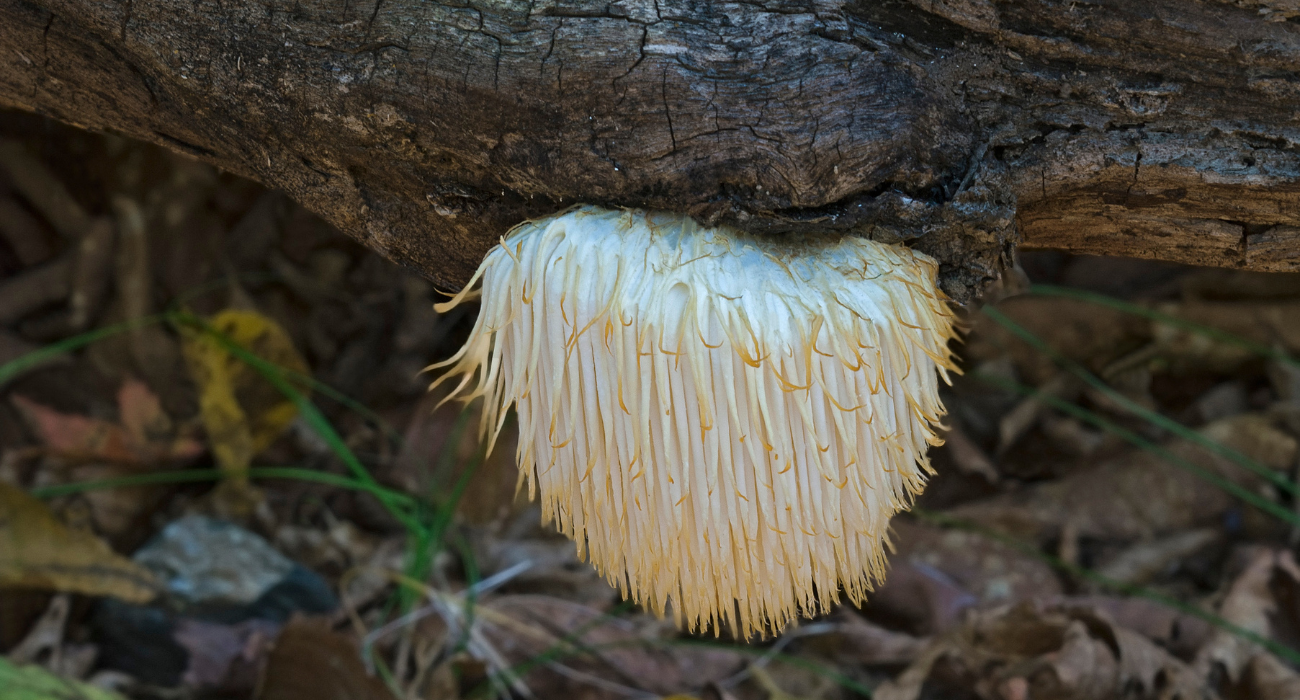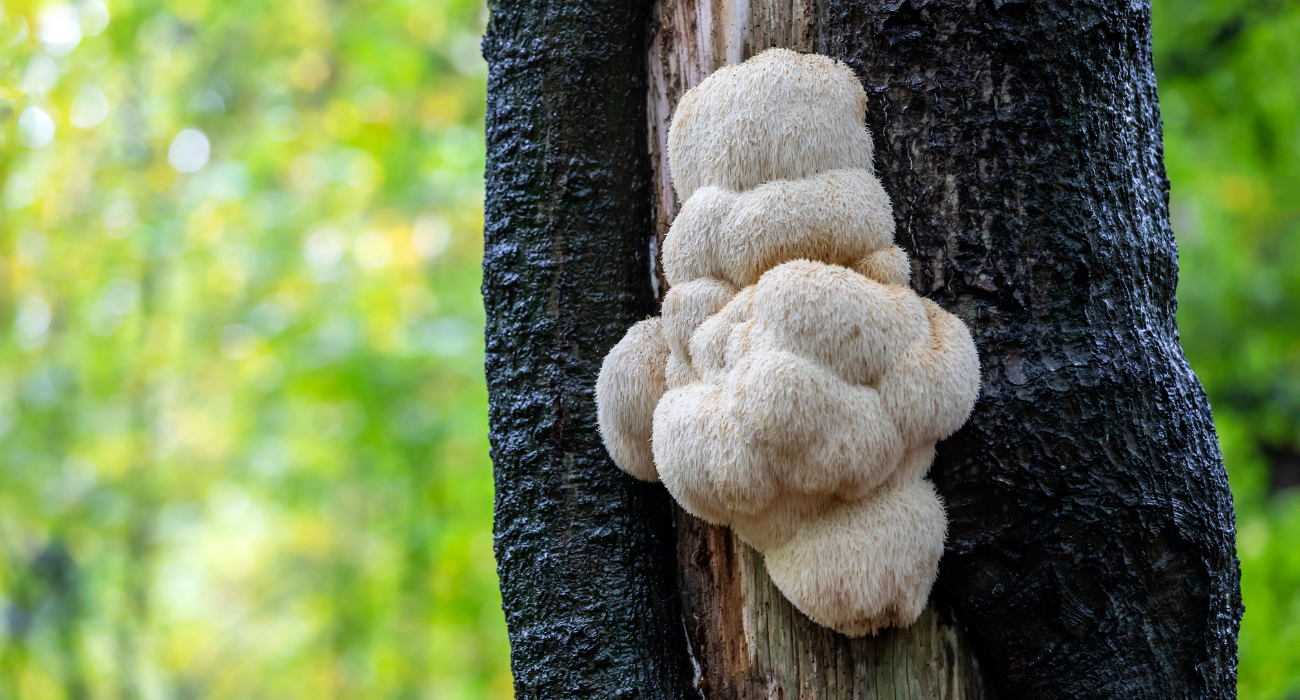Lion's Mane Mushroom - All You Need To Know!
Posted by Calum Napier on
Lion's Mane mushroom is one of the coolest looking fungi around - not only cool but fascinating too boot!
Lion's Mane, or scientifically known as Hericium Erinaceus, is abundant in nutritional & medicinal properties. Belonging to the tooth fungus group, a genus known for its tooth or spine like fruiting bodies this magical fungi can be found on hardwood trees in temperate forests throughout the Northern Hemisphere.
Lion's Mane History...Well, A Brief One

Lion's Mane, referred to as Hou Tou Gu in China, has played a role in Ancient Chinese Medicine before it was introduced to the west. According to Ancient Chinese Medicine, Lion's Manes unique power supports all five internal organs - Liver, Spleen, Lung, Heart & Kidney. It is also hailed to combat the deficiency of Qi, or “life force” due to it containing large amounts of NGF (Nerve Growth Factor - more on that later!).
Buddhist monks were even known to use powdered Lion's Mane to increase brain focus during meditation.
Lion's Mane - once an only foraged fungi - was then cultivated in 1988 & is now widely grown indoors on hardwood by fungi lovers worldwide!
Nerve Growth Factor (NGF)

There are several proven benefits to Lion's Manes ability to improve cognition, one protein in particular, NGF, could be responsible.
NGF is a protein that stimulates the production of new nerve cells & strengthens existing ones. Lion’s Mane may encourage damaged nerves to grow & repair more quickly. These findings are particularly promising for neurodegenerative diseases like Alzheimer’s disease, Parkinson’s disease & stroke, as Lion’s Mane may slow or reverse cell degeneration in the brain.
In 2008, a study found Lion’s Mane effectively improve cognitive function in older adults. Similarly, studies with rodents have found Lion’s Mane may potentially have protective effects on brain cells & could therefore improve memory & promote the creation of new neurons.
For example, in one study, memory impaired mice were fed a diet consisting of 5% dried Lion’s Mane Mushroom. The results found the mice fed on the Lion’s Mane diet performed significantly better in a standard Y maze test – a standardised test to assess memory in rodents. Interestingly, the mice regained another cognitive capacity as measured by the curiosity they had towards exploring novel objects compared to familiar ones.
NGF & BDNF are proteins that stimulate the production of new cells & strengthen existing ones. NGF also plays an important role in forming myelin, the sheath around nerve cells that helps brain cells do their job. BDNF increases brain plasticity, which helps your brain cells stay resilient in the face of stress or aging.
Researchers believe that Lion’s Mane antioxidant activity neutralises free radicals, preventing them from causing inflammation or damaging your cells. On top of this, researchers have also found that hericenones & erinacines from the fruiting body & mycelium of Lion’s Mane easily cross the blood-brain barrier to stimulate NGF.
These important findings suggest that not only can lion’s mane slow cell degradation, but it could potentially reverse it.
Put simply, taking Lions Mane may help you improve brain functioning & also help reverse the effects of ageing.
Speeds Up Recovery From Nervous System Injury

Injuries to the nervous system, such as brain or spinal cord injuries, can be life-changing. They often cause paralysis or loss of mental functions. Research has found that Lion’s Mane Mushroom may help speed recovery in central nervous system injuries.
It is thought to do this by stimulating the growth & repair of nerve cells.
In one study, Lion’s Mane extract has been shown to reduce recovery time by 23–41% when given to rats with nervous system injuries.
Lion’s Mane extract may also help reduce the severity of brain damage after a stroke. For example, another study conducted in 2010 found high doses of Lion's Mane given to rats immediately after suffering from a stroke helped reduce both inflammation & the size of the brain-related injury by an average of 44%.
Mood Boost

Lions Mane has long been reported to improve mood & provide balance, especially in those suffering from depression. In 2010, researchers examined the effects of Lion’s Mane Mushroom on 30 women over a four-week period.
During this period participants were either given Lions Mane cookies or placebo cookies. At the end of the four weeks, the Lions Mane Mushroom group reported a significant improvement in mood.
Whilst this is a small study, these findings still complement a growing body of evidence that suggest Lions Mane is great natural treatment option for those wanting to feel more balanced.
Immune System Boost

A weak immune system puts the body at risk from developing infectious diseases such as Covid-19 or influenza. Luckily, Lion’s Mane can help strengthen you immune system & leave you less vulnerable.
Animal research shows that Lions Mane Mushroom can boost immunity by increasing the activity of the intestinal immune system, which protects the body from pathogens that enter the gut through the mouth or nose.
One study even found that supplementing with Lion’s Mane extract daily nearly quadrupled the lifespan of mice injected with a lethal dose of salmonella bacteria.
Protects The Brain and Memory

Lion’s Mane Mushroom and its extracts have been shown to reduce memory loss in mice. It also prevents neuronal damage caused by amyloid-beta plaques, which build up in the brain during Alzheimer’s disease.
While no studies have analysed whether Lion’s Mane Mushroom is beneficial for Alzheimer’s disease in humans, it appears likely to boost mental functioning.
A study in adults with cognitive impairment found that consuming 3g of Lion’s Mane Mushroom daily for four months significantly improved mental functioning. Furthermore, these benefits disappeared when supplementation stopped.
Lion’s Mane ability to promote nerve growth and protect the brain from Alzheimer’s-related damage may explain its beneficial effects on brain health.
Help Manage Blood Sugar Levels

Lion’s Mane may be beneficial for diabetes management by improving blood sugar control and reducing some of these side effects. Several animal studies have shown that Lion’s Mane can cause significantly lower blood sugar levels in both normal and diabetic mice, even low dosages.
Furthermore, in mice with diabetic nerve damage, six weeks of daily Lion’s Mane extract significantly reduced pain, lowered blood sugar levels and increased antioxidant levels.
Lion’s Mane shows potential as a therapeutic supplement for diabetes, but more research is needed to determine exactly how it might be used in humans.
May Help Fight Cancer

Some research suggests that Lion’s Mane’s unique qualities may have cancer-fighting abilities.
One study found that when Lion’s Mane extract is mixed with human cancer cells in a test tube, they cause the cancer cells to die at a faster rate. This has been demonstrated with several types of cancer cells, including liver, colon, stomach and blood cancer cells.
In addition to killing cancer cells, Lion’s Mane extract has also been shown to slow the spread of cancer. One study in mice with colon cancer found that taking Lion’s Mane extract reduced the spread of cancer to the lungs by 69%.
Another study found that Lion’s Mane extract was more effective than traditional cancer medications at slowing tumour growth in mice, in addition to having fewer side effects.
Conclusion
In short, Lion’s Mane may alleviate symptoms of depression, protect against dementia, reduce mild symptoms and help repair nerve damage.
It also contains strong anti-inflammatory, antioxidant and immune-boosting abilities and been shown to lower the risk of cancer, heart disease and diabetes in animals.
However, while the current research is promising, many of the current studies have used mice and more human research is needed to confirm findings.
The potential health benefits of taking Lion’s Mane are huge. What’s more is that side effects are virtually unheard of even at high doses.
- Tags: COGNITION, IMMUNE SYSTEM, LION'S MANE, MUSHROOMS, NERVE GROWTH FACTOR, NGF
← Older Post Newer Post →
0 comments
